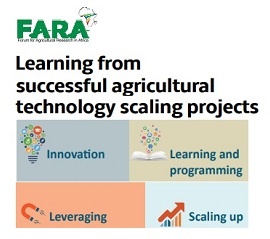Capacity Building & Communication for Successful Scaling of Technologies. Towards a Vibrant and sustainable Agrarian Sector in Africa
07/02/2018


The book "Strategies for Scaling, Agricultural Technologies in Africa", by Ajayi M.T, Fatunbi AO and Akinbamijo O.O. (FARA*, 2018) is part of the First Batch of FARA’s Publications for the Year 2018 ** providing relevant knowledge for Agricultural Research-for-Development (AR4D), including operational instruments of the Integrated Agricultural Research for Development (IAR4D) called Innovation Platforms (IPs).
The above-cited work presents multiple dimensions and factors to consider for successful scaling up of technologies in Africa, - in order to deliver a vibrant and economically sustainable agrarian sector.
This entry will focus on some Capacity Building & Communication aspects - that count among the most essential factors for management and dissemination of knowledge resources and for scaling up technologies, - to achieve the aforementioned purpose.
.jpg)
|
TECHNOLOGIES ... WHY & HOW? |
Advances in Africa agriculture is contingent on the volume of technologies that is available for use in the sector. Despite the fact that Africa has a lot of technologies on the shelve, - efforts into their generation, introduction, adaptation etc. have contributed only to a slight move into socio economic benefit for the stakeholders in the agricultural sector on the African continent.
This means that - in order to bring technologies (with very high potentials) to scale, - to unfold the socioeconomic benefits from the agricultural sector, - there is a need for additional actions...
.jpg)
|
CAPACITY BUILDING IN THE WIDER CONTEXT : |
A FACTOR FOR SUCCESSFUL SCALING OF TECHNOLOGIES |
Capacity Building at all levels is the key to technology adoption, use, and impact creation.
One of the lessons learnt on IPs management is the need for Capacity Improvement on the IAR4D among the project implementers (along food and agriculture value chains), especially the Task Forces, collaborating institutions, and IP partners.
Moreover, although training and development of the staff in charge of implementing scaling up initiatives is important, it is not a panacea on its own, because without the other key elements of institutional Capacity Building as well as leadership, political support, incentives and so on, training will not have a lasting impact.
Furthermore, the lessons learned during the pilot process of Capacity Building should be consistently applied.
.jpg)
|
PSTAD PROJECT : |
A GOOD EXAMPLE FOR DISSEMINATING TECHNOLOGIES THROUGH CAPACITY BUILDING & ICT |
A good example of the use of Capacity Building and ICT for disseminating technologies was the FARA's PSTAD (Promotion of Science and Technology for Agricultural Development) Project, focused on the deployment of the following three components:
- Knowledge and Information Management: This component created a functional African information and communications technology network for access and exchange of agricultural information;
-
Technology Transfer and Good Agricultural Practices: This was a support to the wide-scale adoption and dissemination of the new proven agricultural technologies;
-
Project Management and Coordination.
Within the frame of this project:
- An African portal on Agricultural Information System (AIS), and
- An open online agricultural information and knowledge platform for and by Africans - the eRAILS,
were established to link the target NARS (National Agricultural Research System) to develop websites, in order to enhance learning, and information and knowledge exchange among scientists and researchers.
Thus, the project provided researchers, scientists (and also farmers ! ) with a platform to engage and exchange ideas and resources and, thereby, to reduce duplication of efforts, save time and make research efforts more meaningful and rewarding for different actors in African agriculture.
Through the Dissemination of New Agricultural Technologies in Africa (DONATA) initiative, the ICRA (Building skills changing outlooks) helped the PSTAD project widespread adoption and use of new and proven technologies.
.jpg)
|
Amid other major activities of the Capacity Building strategy presented in the “Strategies for Scaling Agricultural Technologies in Africa” (p.70), there is:
|
.jpg)
|
DGROUP SYSTEM... |
AS PART OF THE INFORMATION SHARING ASPECT OF SCALING |
DGroups is an online communication tool that makes it possible for individuals and organisations in the development sector to come together and interact with one another, and to share knowledge between and among themselves.
As used in the PSTAD project, the DGroup system has proven to be a good mechanism for knowledge sharing, and for scaling agricultural technologies and innovation. In particular, the established DGroup has been used to widen the scope for technology dissemination as well as lessons learnt at national, sub-regional and continental levels.
|
Amid other major activities of the communication strategy presented in the “Strategies for Scaling Agricultural Technologies in Africa” (pp.68-69), there are:
|
.jpg)
* The Forum for Agricultural Research in Africa (FARA) is the apex continental organization responsible for coordinating and advocating for AR4D. FARA serves as the technical arm of the African Union Commission on matters concerning agriculture science, technology and innovation.
** The First Batch of FARA’s Publications for the Year 2018 comprises also:
- Innovation Opportunities in the Small Ruminants livestock sector in Benin - A GUIDE BOOK
- Innovation Opportunities in Mango production in Mali - A GUIDE BOOK
- Innovation Opportunities in Sweet Potato Production in Kenya
Related:
- Recorded Webinar on: ‘Sharing Knowledge on Capacity Development (CD) for Agricultural Innovation Systems (AIS) through TAPipedia
- Knowledge Management & Sharing for Agricultural & Rural Development (ARD): Reflecting Experiences & Views Expressed (CTA)
-
CGIAR Capacity Building & other Efforts to Improve Food and Nutrition Security...The inside story
-
Using Dgroups to scale up online Networking and Communication in the Rural Water Supply Network
- FRR Volume 2 No 1_2018: Scaling strategies for agricultural innovations in Nigeria (Click to download a full copy)
- UNEP's report (2017) Strengthening the Science-Policy Interface: a Gap Analysis has evolved in 3 main ways: (1) From identifying problems to uptake of solutions; (2) Dealing with wider audiences and divergent viewpoints; (3) Increasing effective exchange of evidence
- South-South Cooperation of the Food Agricultural Organisation of the UN
